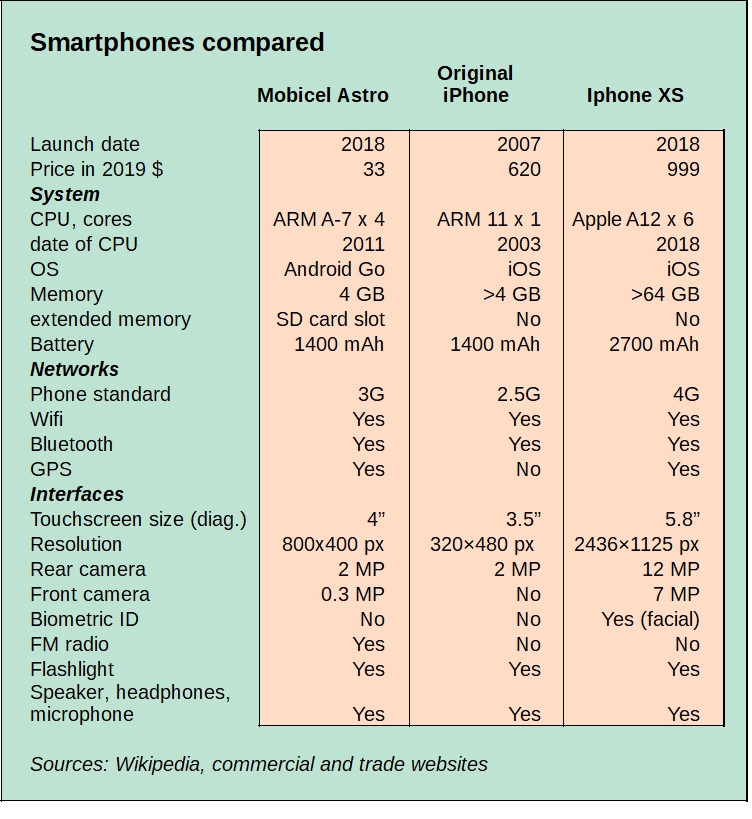For your weekend edification, I bring you a smartphone review. I have not actually seen or touched the phone in question, for reasons that will become evident, so I am going entirely on Web information.
The phone is a basic model sold by transnational South African mobile telco MTN. It’s the Mobicel Astro, and retails for 449 rand or $33.

This is not the cheapest on the market. MTN will sell you this for 249 rand or $18. Vendors sensibly avoid the term “smartphone” for such handsets. They don’t run a full mobile OS and are limited to browsing and, crucially, messaging and VOIP with WhatsApp. The Astro is recognizably from the same genus as the iPhone and its many emulators.
Here is a table comparing the Astro to the original and the latest iPhone.

I leave out the infinite variety of apps they can all run. Here are a few; I mark with an asterisk the ones where the smartphone does as good a job as a purpose-built device, for the others it’s second best, just as with a Swiss Army knife.
*Phone, *calculator, *clock/timer/alarm, *calendar/diary, *geolocator, *messaging device, *notebook, camera, recorder, compass, flashlight, Web browser, word processor, spreadsheet processor, music player, video player, photo viewer, UI for plug-in sensor, game console.

Some quick takeaways.
1. The specs of the Astro are at least as good as those of the original iPhone in every respect, at under a tenth of the price.
2. Apple has not given its customers any price gains, and has even raised prices.
3. Technical progress since the first iPhone has been modest. The $1000 iPhone XS has just two significant new functions over the 12-year-old original: the selfie camera (which the Astro has) and the biometric ID (which the Astro lacks).
Now of course Apple fans will say: iPhones are better made; everything works better and faster; the A12 processor chip in particular is a monster that can run a battleship; the image quality from the camera is of a different order from cheap phones. All true. I maintain that the main revolution was all in the original iPhone, and the Astro matches it.
The Astro and its competitors are far more important devices in their social impact than an incremental status display like the iPhone XS. In Africa the Internet means mobile, outside a few lucky cities. Mobile phone penetration is 44%: more than one per family. A third of these phones are smart, or 250 million. Cheap handsets will speed this up.
Much of this impact is good: better access to information on health, prices and technology, for one. But we have seen in the well-educated USA and UK the hacking of major elections by manipulation of social media. In the Rwandan genocide 0f 1994, the Interahamwe only had old-fashioned radio to work with. Their successors will have Facebook and Twitter.
You’ll be happy to know that all the non-Apple people around the world involved in making iPhones have collectively made and continue to make far more money from the sale of an iPhone than Apple does.
That is not the case. Apple’s gross margin on the iPhone X family is credibly estimated at 64%, the 36% of costs including small amounts of labour by US employees. Its suppliers in China, Taiwan, South Korea, the DRC etc get less than half. Apple is a brilliantly successful monopolistic racket.